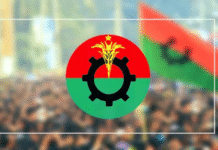The battling Begums, as they are often referred to by foreign journalists, finally spoke on phone Saturday, but hopes of an early dialogue quickly faded.
Prime Minister Sheikh Hasina invited arch-rival Khaleda Zia to dinner on Monday with all she wanted to bring along.
The BNP chief rejected it and announced that they would go ahead with their 60-hour general strike beginning Sunday.
For the millions who lose their daily bread during strikes, this was bad news.
Even for the middle class and the elite, it was no better.
The uncertainty affects trade and commerce. That is bad for workers and businesspersons alike.
Except for hardline political activists who would be out on the streets fighting pitched battles at the drop of a hat, the silent millions had hoped for a way out of the impasse.
They want elections. They want Bangladesh’s democracy to ensure smooth, peaceful transition.
The nation’s future, specially its economic growth and social progress, depends on it.
But most of them are confused, not in a position to assess what would ensure a smooth democratic transition.
Khaleda Zia would insist — as would her allies — that a neutral, non-party caretaker is essential for a free and fair vote.
Sheikh Hasina offers an all-party interim cabinet with adequate Opposition representation to run the routine business of the state with the Election Commission conducting the polls.
The taste of the pudding is in the eating. So none can say who is right until what they offer is tried out.
The last caretaker did enough to discredit the system by crossing the red line, argues Hasina and her backers.
That provided Awami League the raison d’etre for scrapping the system.
The Awami League’s defeat in successive city corporation polls — from Chittagong in 2010 to Gazipur in 2013 — has raised the spectre of anti-incumbency against the ruling coalition.
But it gave Hasina a shot in the arm to claim her government was capable of holding fair elections — or else how her party lost so many polls, and so convincingly.
If mature democracies, such as India or UK or US, can have polls without anything like a caretaker, why can’t Bangladesh have one is what Hasina reasons.
Khaleda, who herself suffered arrest during the last caretaker as did Hasina, remains unconvinced and is not willing to take a chance.
The insecurity of both leaders and the alliances they lead has led the teeming millions to sheer despair.
They don’t want strikes and violence, they don’t want political turmoil; they want a solution — a way out of the impasse.
Bangladesh’s democratic process cannot be held hostage to the whims and insecurity of leaders.
Foreign powers with a geo-political stake in Bangladesh are jockeying for influence, backing horses they feel may help their cause.
They better limit themselves to explaining to both the squabbling ladies that the confrontation threatens Bangladesh’s fledgling democracy.
Other than pushing the leading parties for credible inclusive elections, they have no business fishing in troubled waters.
Any ‘formula’ from anywhere that would undermine the country’s democracy by suggesting postponement of elections or foisting unelected interim bodies — one in the style of the last caretaker –is better shot down right away.
This is a country which has made considerable social and economic progress on the sheer sweat of its working class — the hapless men and women who slog in the garment factories or in foreign lands often under horrendous conditions.
They send back home hard-earned millions in remittances, while the high and mighty loot and siphon off billions to buy property elsewhere in the world.
The least Bangladesh’s politicians, specially the two leading ladies with so much personal tragedy in life, can do for their people is to give them a semblance of stability, so that they earn their daily bread without fear of losing life and limb.
Source: Bd news24










